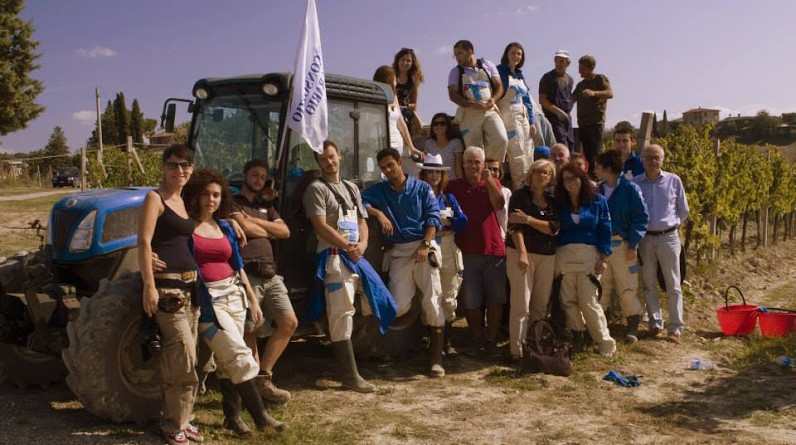US ambassador to Vatican praises UD grads for human rights work
By: Cassidy Colarik – Staff Writer
The [UD graduates at Rondine]…have already demonstrated great dedication to humanitarian issues.” – Kevin Hackett, U.S. ambassador to the Vatican
It was a surprise for University of Dayton graduates Rachel Bernardo, Adrianne Lewis and Gabriella Cipriani when Ken Hackett, US ambassador to the Vatican, praised them for their work with the Nobel Peace Prize-nominated Rondine Association.
“We were told the day of that Hackett might mention our work with Rondine, but we weren’t told he would stand up and read things off about UD and ourselves,” Lewis said. “It’s a good feeling to know we’re making progress because human rights is a big deal to UD.”
Rondine, a program that is based in Arezzo, Italy, selects about 30 students a year to travel abroad and learn peace-building skills. Among the international students selected, Bernardo, Lewis and Cipriani were the only Americans chosen to study at Rondine.
“That they all came from the University of Dayton is not surprising,” Hackett said during the announcement of Rondine’s Nobel nomination. “A friend of mine was its longest serving president, Brother Ray Fitz, and he saw clearly the role of young people in fostering peace.
The American students chosen to participate in the program—all coming from the University of Dayton in Ohio—have already demonstrated great dedication to humanitarian issues, conflict resolution and the promotion of a culture of peace.”
Rondine brings together students from all around the world to acquire conflict resolution skills that they can bring back and apply in their countries.
“[At Rondine] you can be friends with your enemy even though your countries are in conflict,” Lewis said.
Bernardo and Lewis graduated from the University of Dayton in 2014. They then continued their masters’ studies in Rondine for 13 months before returning to UD to continue their studies.
While studying as an undergrad, Bernardo worked in UD’s Office of Multicultural affairs where she arranged educational programs and also served as a mentor to first-year students.
As an undergrad, Lewis studied in Malawi, where she researched women’s empowerment and worked on secondary school development. Lewis also worked with Abolition Ohio, an anti-human trafficking organization in UD’s Human Rights Center.
Cipriani, a 2015 University of Dayton graduate, began her studies at Rondine in July. As an undergrad, Cipriani also worked with Abolition Ohio, where she helped raise human trafficking awareness in schools and designed resources for human trafficking survivors on how to seek and acquire services.
“The premise of [Rondine] is an amazing thing,” Cipriani said. “Living together with all of these people from different areas is what fueled my decision to apply for Rondine.”
“I am always observing and communicating with people around me, and I wanted to see how the different cultures collided and interacted,” Bernardo added.
The first three months of the 13-month long program involves international students’ learning and becoming fluent in the Italian language. The students then take their courses at the University of Florence in Italian. Some of the courses that students study to enhance their peace-building skills include marketing courses, storytelling and conflict classes.
Once they completed these courses, Bernardo and Lewis traveled to schools, where they implemented programs about resolving conflicts within groups.
While studying at Rondine, Bernardo and Lewis also participated in a show called Spettacolo (“performance” in Italian). This show combined music and dialogue about conflict resolution.
Bernardo and Lewis’ experiences during their time in Italy are experiences that Cipriani will also partake in once she passes the B1 test, which tests for Italian fluency.
While living with other students from all around the world and learning peace conflict skills, Bernardo and Lewis saw firsthand how impactful the premise of the program is. Bernardo and Lewis both shared that the meaningful relationships that they formed while in the program, was the most inspiring part of being abroad.
“It’s great to be at Rondine because you see things not from a television screen, but instead are there living with people who go through it,” Lewis said. “You come to understand from them: That it is very different than sitting in front of the T.V. screen and being able to turn it off when you want.”
“It inspires you to realize that yes, we live in the U.S., we love our country,” Bernardo said, “but it is also important to communicate with other countries and see how they view the world as well.”
[Best_Wordpress_Gallery id=”106″ gal_title=”UD at Rondine”]
Photos courtesy of Adrianne Lewis.
Visit rondine.org/en for more information about the Rondine Association.

